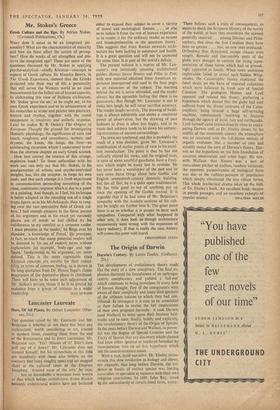Mr. Stokes's Greece
Greek Culture and the Ego. By Adrian Stokes. (Tavistock Publications, 15s.)
WHAT does it mean to be an integrated per- sonality? What are the characteristics of maturity and how do these affect the nature of percep- tion? How do works of art strengthen and pre- serve the integrated ego? These are some of the questions discussed by Mr. Stokes in applying psycho-analytical—chiefly Kleinian—concepts to aspects of Greek culture. Sir Maurice Bowra, in The Greek Experience, showed that the Greeks projected into their way of life a personality that still serves the Western world as an ideal measurement for the fullest use of human capacity. In elaborating this view of Hellenic civilisation, Mr. Stokes 'gives the air,' as he might say, to his own Greek experience and to its advancement of his researches as writer and painter into plasticity, texture and rhythm, together with the moral component in creativity and aesthetic response. Later he makes R. B. Onian's The Origins of European Thought the ground for investigating Homeric physiology, the significance of taste and touch, roughness and smoothness, wetness and dryness, the knees, the lungs, the liver—an exhilarating excursion which- I understood better than the abstruse chapter on early Greek science.
How best convey the essence of this- strange, explosive book? To those unfamiliar with his work one can only say that Mr. Stokes, in his amalgamation of artistic and psycho-analytical insights, has, like the sculptor, to forge his own tools; and that each attempt is a fresh experiment in communication demanding something of the close, continuous response which is due to a poem or a painting. And though, as I feel, his technique is better adapted to the rounding out, of a single tragic figure, as in his Michelangelo, than to rang- ing over the vast speculative field of Greek cul- ture, I had enough pleasure in the fierce pursuit of. his argument and in his exact yet curiously plastic use of words to feel chilled by his indifference to my comfort as a common reader. 'I must presume in the reader,' he flings over his shoulder, 'a knowledge of Freud.' He presumes, in fact, so much that many potential readers will be deterred by his use of esoteric terms without explanation; fox' example, 'body-ego's and 'ego- figure,' fundamental to his argument, are never defined. This is the more regrettable since kleinian concepts are notable• for their reduci- bility to terms of common .feeling, as is shown in his long quotation from Dr. Hanna Segal's classic description of the depressive phase in childhood. There will have to' be some such adjustment of Mr. Stokes's private vision if he isto extend his audience from a gibup of initiates to a wider










































 Previous page
Previous page